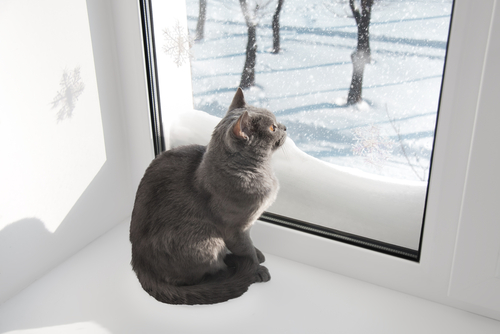
Winter can bring a set of challenges when it comes to caring for your beloved pets. The cold weather, coupled with the shorter days, can be harsh on our furry friends. This is why understanding the importance of pet winter care is essential.
The Importance of Pet Care in Winter
Pet winter care is vital, not just for the comfort of your pet, but also for their overall health and wellbeing. The cold weather can affect pets in ways we might not initially consider. For instance, the cold can make it difficult for pets to maintain a healthy body temperature, which can lead to illnesses such as hypothermia.
Additionally, winter often means less outdoor exercise and activity for our pets. This lack of physical and mental stimulation can lead to weight gain and boredom, which can in turn lead to destructive behaviors.
The cold, dry weather can also affect our pets' skin and coat, leading to dryness, flaking, and even painful cracks in their paw pads. Therefore, understanding the importance of winter pet care and adapting our pet care routines is crucial.
Tip 1: Keeping your Pet Warm
Keeping your pet warm during winter is the first crucial step in pet winter care. Pets can lose body heat quickly, so it's essential to provide a warm and cozy environment for them.
Invest in a good quality pet bed and warm blankets. These can provide much-needed warmth and comfort for your pet during the cold winter nights. Make sure you place their bed away from drafts and off the cold floor.
If your pet spends time outside, ensure they have a warm and dry shelter to protect them from the elements. However, remember that outside conditions during winter can be extremely harsh, and no pet should be left outside for extended periods.
Tip 2: Protecting Your Pet's Paws
Our pets' paws are incredibly sensitive and can quickly become damaged by the cold, wet, and icy conditions of winter.
To protect your pet's paws, consider investing in pet-safe ice melts for your walkways and driveways. These products are formulated to be safe for pets' paws, unlike traditional salt-based ice melts that can cause burns and irritation.
Additionally, consider using paw wax or pet booties to provide an extra layer of protection for your pet's paws. These products can help prevent painful cracks and dryness caused by the winter weather.
Tip 3: Ensuring Proper Nutrition and Hydration
Winter can affect your pet's nutrition and hydration needs. The cold weather can increase their energy expenditure, meaning they may require more food to maintain their body temperature.
Ensure your pet's diet is balanced and nutritious, providing all the necessary vitamins and minerals they need. Consult with your veterinarian about potentially increasing your pet's food intake during winter, especially if they spend a lot of time outdoors.
Hydration is just as crucial in winter as it is in summer. Make sure your pet always has access to fresh, unfrozen water. Remember, pets can easily become dehydrated in winter due to the dry air and increased energy use.
Tip 4: Regular Veterinary Check-ups
Regular veterinary check-ups are vital for pet winter care. These check-ups can help catch any potential health issues early, before they become serious problems.
Your veterinarian can also provide tailored advice for your pet's winter care, based on their breed, age, health status, and lifestyle. They can advise on things like diet adjustments, winter grooming needs, and more.
Remember, prevention is better than cure. Regular veterinary visits can help ensure your pet remains fit and healthy throughout the winter season.
Tip 5: Winter Specific Grooming
Winter can affect your pet's skin and coat, leading to dryness, flaking, and potential irritation. Therefore, adjusting your pet's grooming routine for winter is essential.
Consider using pet shampoos and conditioners formulated for dry and sensitive skin. These products can help replenish moisture and protect your pet's skin and coat during the harsh winter months.
Avoid clipping or shaving your pet's coat during winter. Their fur provides much-needed insulation against the cold. Instead, regular brushing can help remove dead hair and improve circulation, helping to keep them warm.
Tip 6: Providing Physical and Mental Stimulation Indoors
Winter often means less outdoor activity for our pets, which can lead to boredom and potential weight gain. Therefore, providing physical and mental stimulation indoors is a crucial part of pet winter care.
Indoor games, puzzle toys, and training sessions can help keep your pet physically active and mentally stimulated during the colder months. Not only does this help prevent weight gain, but it also helps prevent boredom and destructive behavior.
Remember, a stimulated pet is a happy pet. Keeping them active and engaged will help ensure they remain happy and healthy throughout the winter season.
Tip 7: Watching out for Winter Hazards
Winter brings with it a host of potential hazards for our pets. From antifreeze spills in garages to holiday decorations and foods, there are many things that can pose a risk to our pets during the colder months.
Always ensure your pet is supervised and that potential hazards are kept out of their reach. Remember, pets are naturally curious, and something that seems harmless to us can be dangerous for them.
If you suspect your pet has ingested something harmful, contact your veterinarian immediately. Quick action can often mean the difference between life and death.
Consulting with a Veterinarian
While these 7 pet care tips provide a good starting point, it's essential to consult with a veterinarian for personalized pet winter care advice. Every pet is unique, and their winter care needs can vary based on their breed, age, health status, and lifestyle.
Your veterinarian can provide tailored advice to ensure your pet remains healthy and happy throughout the winter season. They can advise on everything from diet adjustments to winter grooming needs, ensuring your pet gets the best possible care.
Ensuring a Healthy, Happy Pet this Winter Season
Winter can be a challenging time for our pets, but with the right care and attention, we can ensure they remain healthy and happy. By following these 7 pet care tips and consulting with a veterinarian, you can ensure your pet gets the best possible care this winter. A healthy and happy pet is a joy to have around, no matter the season.
To learn more tips on caring for your pet this winter, visit Madison Animal Care Hospital in our Madison, Alabama office. Call 256-461-7575 to schedule an appointment today. For emergencies, call (256) 715-8389.






